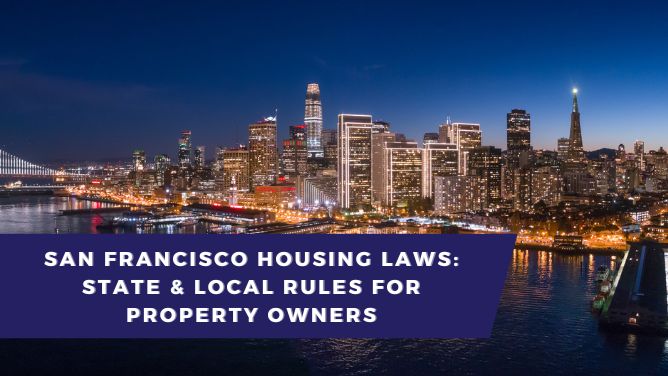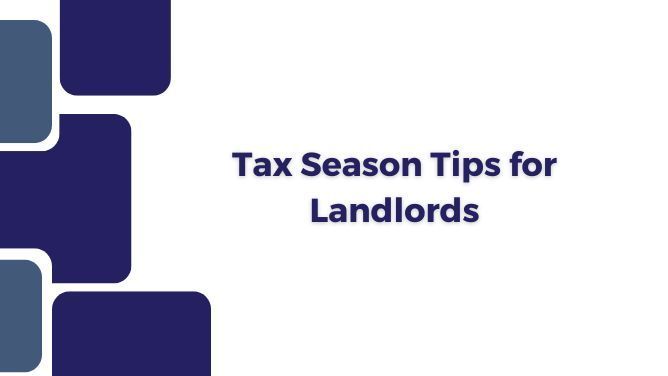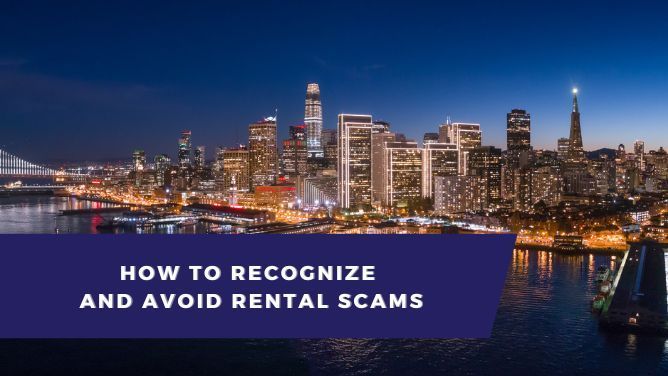SAN FRANCISCO RENTAL LAWS AND REGULATIONS ALL INVESTORS SHOULD BE AWARE OF San Francisco Property Management Help

Investing in San Francisco real estate is lucrative and always interesting.
But it’s also risky.
Your investment properties are worth a lot of money and there are a lot of laws that dictate how you lease them, manage them, maintain them, and interact with the tenants who rent them.
California is notoriously strict when it comes to rental laws. San Francisco’s regulations are even more robust when it comes to tenant protections. This can leave you in danger of making an expensive legal mistake, especially if you don’t know the laws or you haven’t been able to keep up with changes in the laws.
As an investor, you need to know the laws or partner with a
professional San Francisco property manager
who can keep you above board. Property managers invest in continuing education and work closely with attorneys and other experts to ensure all state, federal, and local laws are followed and understood.
Your tenants are well-informed about their rights. You need to be informed, too.

Understanding Rent Control and Just Cause Eviction Ordinances
Rent Control Laws
Several cities in the Bay Area have enacted rent control laws to stabilize rents and protect tenants from excessive rent increases. These regulations typically cap the amount by which landlords can increase rent annually and limit the frequency of such increases. Cities like San Francisco, Oakland, Berkeley, and San Jose have some of the strictest rent control measures.
In San Francisco, for example, the Rent Ordinance covers most residential rental units built before June 13, 1979. Under this ordinance, the allowable rent increase is determined annually by the Rent Board based on the Consumer Price Index (CPI). For the 2024-2025 period, the allowable increase is set at 1.7%. Additionally, landlords must provide tenants with a written notice of any rent increase, typically 30 days in advance for increases of 10% or less and 90 days for increases above 10%.
- To figure out a 1.7% rent increase, simply multiply the current rent by 0.017. For example, if the rent is $2,000, multiply $2,000 by 0.017, which equals $34. This means the new rent would be $2,034 ($2,000 + $34).
Just Cause Eviction Ordinances
Just cause eviction ordinances are established to protect tenants from arbitrary evictions, ensuring they can only be removed for valid reasons. These laws outline specific grounds for eviction, such as non-payment of rent, violations of lease agreements, or if the landlord intends to occupy the unit themselves.
In Oakland, the Just Cause for Eviction Ordinance applies to most rental units built before January 1, 1996. Under this ordinance, landlords are required to provide a legitimate reason for eviction, and failing to do so may lead to legal consequences. Common valid reasons for eviction include:
- Non-payment of rent
- Illegal activities on the property
- Necessity for significant repairs that require the tenant to vacate
Overall, these ordinances help create a fair and stable rental environment for both tenants and landlords
Compliance with Statewide Regulations
California Tenant Protection Act (AB 1482)
In addition to local ordinances, property owners must comply with statewide regulations such as the California Tenant Protection Act (AB 1482), which took effect on January 1, 2020. This law imposes rent caps and just-cause eviction requirements on many residential properties across California.
Under AB 1482, annual rent increases are limited to 5% plus the local rate of inflation, or 10% of the lowest gross rental rate charged during the preceding 12 months, whichever is lower. For instance, if the local inflation rate is 3.8%, the maximum allowable rent increase would be 8.8% (5% + 3.8%). The law also mandates just cause for eviction after a tenant has continuously and lawfully occupied a rental property for 12 months or more.
Ellis Act
The Ellis Act is a California state law that allows landlords to withdraw their rental properties from the rental market, effectively evicting all tenants, provided certain conditions are met. While the Ellis Act is a statewide law, cities like San Francisco and Los Angeles have implemented additional regulations to govern its use.
In San Francisco, for instance, landlords who invoke the Ellis Act must provide tenants with a minimum of 120 days’ notice, which extends to one year for elderly or disabled tenants. Additionally, landlords may be required to pay relocation assistance to displaced tenants.
Navigating the Tenant Screening Process
Fair Housing Laws
When screening potential tenants, property owners must adhere to federal, state, and local fair housing laws that prohibit discrimination based on race, color, national origin, religion, sex, familial status, disability, and other protected characteristics.
In California, the Fair Employment and Housing Act (FEHA) extends these protections to include sexual orientation, gender identity, gender expression, marital status, ancestry, source of income, and age. It’s essential for landlords to apply consistent screening criteria to all applicants and avoid any practices that could be perceived as discriminatory.
Credit and Background Checks
While conducting credit and background checks is a standard part of the tenant screening process, property owners must ensure they comply with the Fair Credit Reporting Act (FCRA). This federal law requires landlords to obtain the applicant’s consent before running a credit check and to provide an adverse action notice if the application is denied based on information in the credit report.
Criminal background checks can be performed in addition to credit checks, but landlords should be cautious in how they use this information. Blanket policies that disqualify applicants based on criminal history may violate fair housing laws. Instead, landlords should consider the nature and severity of the offense, the time elapsed since the conviction, and whether the offense is relevant to the safety of other residents and property.
Maintaining Habitability Standards
Health and Safety Codes
Property owners are responsible for maintaining their rental units in a habitable condition and complying with state and local health and safety codes. This includes ensuring that the property is structurally sound, has functioning plumbing and electrical systems, and is free from hazards such as mold, pests, and lead-based paint.
In San Francisco, the Department of Building Inspection (DBI) oversees the enforcement of housing codes. Landlords must address any violations promptly and may be subject to fines and penalties for non-compliance.
Habitability Repairs
Tenants have the right to request repairs for issues affecting their rental units' habitability. Under California law, landlords must address these requests within a reasonable timeframe, typically 30 days. Failure to make necessary repairs can result in tenants taking legal action, such as withholding rent, making repairs and deducting the cost from the rent, or suing for damages.
Handling Security Deposits
Collection and Return of Security Deposits
California law regulates the collection, use, and return of security deposits. Landlords can charge a maximum of two months’ rent for an unfurnished unit and three months’ rent for a furnished unit as a security deposit. Upon termination of the tenancy, landlords must return the deposit within 21 days, minus any lawful deductions for unpaid rent, repair of damages beyond normal wear and tear, and cleaning necessary to return the unit to its original condition.
Itemized Statements
If any portion of the security deposit is retained, landlords must provide an itemized statement detailing the deductions and receipts or invoices for the repairs. This transparency helps prevent disputes and ensures compliance with legal requirements.
Staying Informed and Seeking Professional Guidance
Navigating Bay Area rental laws requires continuous education and a proactive approach. Property owners should stay informed about changes in local ordinances and statewide regulations by subscribing to updates from municipal websites, attending landlord workshops, and participating in property management associations.
Additionally, seeking professional guidance from real estate attorneys, property management companies, and local housing authorities can provide valuable insights and help property owners avoid legal pitfalls. These experts can assist with lease agreements, tenant disputes, and compliance with complex regulations, ensuring that your rental business operates smoothly and lawfully.
Managing rental properties in the Bay Area involves more than just finding tenants and collecting rent. It requires a comprehensive understanding of rent control laws, just cause eviction ordinances, tenant protection acts, and habitability standards. By staying informed and seeking professional advice, property owners can navigate the intricate legal landscape, maintain compliance, and foster positive relationships with their tenants. In the ever-evolving Bay Area rental market, knowledge and diligence are key to successful property management.

There’s always more to know
We focused on some of the biggest and most important rental laws in San Francisco and California. But there are others you’ll need to know. Habitability standards, for example, are important to understand. You need to know the difference between a pet, a service animal, and a companion animal. Specific disclosures are required in your lease agreement. There’s a lot to keep up with, so make sure you’re educating yourself on the laws and their changes or working with someone who knows them well.
SAN FRANCISCO PROPERTY MANAGEMENT LEGAL EXPERTISE
We understand the laws in San Francisco and California, and we prioritize our ongoing education and professional development. At BanCal Property Management, we’ve been tracking rent control, eviction, and security deposit laws since 1987. We can make sure you and your property are protected and compliant.
To hear more about our leasing and management services and to ask questions about San Francisco’s rental laws, please
contact us. We also welcome your comments, questions, and suggestions for topics you want to learn about, so please share those too. We’d love to address a question you have in one of our future blogs.








